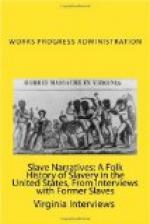The little negro girl lived the usual life of a rural negro in Civil War Time and afterwards. She remembers the “sojers” coming thru the place and asking for food. Some of them camped on the farm and talked to her and teased her.
She tells about one big nigger called “Scott” on the place who could outwork all the others. He would hang his hat and shirt on a tree limb and work all day long in the blazing sun on the hottest day.
The colored folk, used to have revivals, out in the woods. They would sometimes build a sort of brush shelter with leaves for a roof and service a would be held here. Preachin’ and shouting’ sometimes lasted all day Sundays. Colored folks came from miles around when they possibly could get away. These affairs were usually held away from the “white folks” who seldom if ever saw these gatherings.
Observation of the writer.
The old woman remembers the Big Eclipse of the sun or the “Day of Dark” as she called it. The chickens all went to roost and the darkies all thought the end of the world had come. The cattle lowed and everyone was scared to death.
She lived down in Kentucky after the War until she was quite a young woman and then came to Indiana where she has lived ever since. She lives now with her daughter in New Albany.
Special Assignment
Emily Hobson
Dist. #3
Parke County
Interview with Anderson Whitted,
colored ex-slave, of Rockville,
Indiana
[Illustration: Anderson Whitted]
Mr. Whitted will be 89 years old next month October 1937. He was born in Orange County, North Carolina. His mother took care of the white children so her nine children were very well treated. The master was a Doctor. The family were Hickory Quakers and did not believe in mistreating their slaves, always providing them with plenty to eat, and clothing to wear to church on Sunday. Despite a law that prohibited books to Negroes, his family had a Bible, and an elementary spelling book. Mr. Whitted’s father belonged to his master’s half-brother and lived fourteen miles away. He was allowed a horse to go see them every two weeks. The father could read, and spell very well so would teach them on his visits. Mr. Whitted learned to read the Bible first, then in later years has learned to read other things. It was the custom for the master to search the negro huts, but Mr. Whitted’s master never did.
The Doctor often took Mr. Whitted’s grandmother with him to help care for the sick. When the war broke out the Master’s son joined the southern forces. The son was wounded. The Doctor and Mr. Whitted’s grandmother went for the boy. On the way home the Doctor died but the grandmother got the boy home and nursed him back to health. Life for the Negroes was different after the son began running the place, he was not good to them. Mr.




